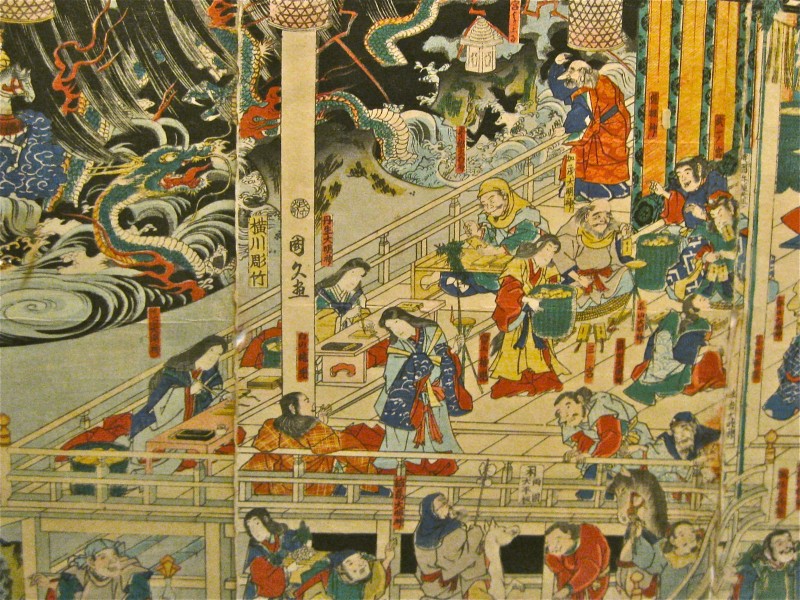 Readers living in Tokyo may well be interested in this talk by a leading figure in the world of Shinto Studies….
Readers living in Tokyo may well be interested in this talk by a leading figure in the world of Shinto Studies….
“Of Matter, Spirits, and Places: Japanese Discourses on The Bodies of the Shinto Divinities (Kami)” by Fabio Rambelli, Sophia U., Dec. 15th
Sophia University Institute of Comparative Culture Lecture Series 2016
December 15, 2016 From 18:30-20:00 Room 301, 3F, Building 10, Sophia University
 One of the striking aspects of Shinto is the vagueness and multiplicity that characterize descriptions of the gods (kami). The general understanding today is that kami are spiritual (immaterial) entities that attach themselves to particular things (rocks, trees, mountains, etc.); however, there are also beliefs that natural objects are divine in themselves. In addition, human beings can, in certain cases, be deified as well. The notion of kami also shares some semantic elements with concepts such as mono (entity endowed with supernatural powers), tama (spirit), and kokoro (mind). In this paper, I present some aspects of premodern Japanese discussions on the body of the kami (shintai), with their multiplicity and ultimate irreducibility, with special emphasis on medieval doctrinal texts and early modern philosophical treatments by Confucians and Nativists. I will suggest that a shared feature of the theology of the kami throughout history is a constant oscillation (and indecision) between materiality and spirituality, a structural oscillation that is responsible for both the constancy of certain themes and religious innovation.
One of the striking aspects of Shinto is the vagueness and multiplicity that characterize descriptions of the gods (kami). The general understanding today is that kami are spiritual (immaterial) entities that attach themselves to particular things (rocks, trees, mountains, etc.); however, there are also beliefs that natural objects are divine in themselves. In addition, human beings can, in certain cases, be deified as well. The notion of kami also shares some semantic elements with concepts such as mono (entity endowed with supernatural powers), tama (spirit), and kokoro (mind). In this paper, I present some aspects of premodern Japanese discussions on the body of the kami (shintai), with their multiplicity and ultimate irreducibility, with special emphasis on medieval doctrinal texts and early modern philosophical treatments by Confucians and Nativists. I will suggest that a shared feature of the theology of the kami throughout history is a constant oscillation (and indecision) between materiality and spirituality, a structural oscillation that is responsible for both the constancy of certain themes and religious innovation.
Fabio Rambelli (PhD, 1992) teaches Japanese religions and cultural history at the University of California, Santa Barbara, where he holds the ISF endowed chair in Shinto Studies. His research focuses on Japanese esoteric Buddhism, on the interaction of Buddhism with local cults in Asia, and on the formation of Shinto discourses in premodern Japan. Books include Vegetal Buddhas (2001), Buddhas and Kami in Japan (with Mark Teeuwen, 2001), Buddhist Materiality (2007), Buddhism and Iconoclasm in East Asia (with Eric Reinders, 2012), A Buddhist Theory of Semiotics (2013), Buddhist Anarchism (2014).
This talk is coordinated by Caroline Hirasawa (FLA) for ICC Research Unit “Materialities of the Sacred.”
Institute of Comparative Culture (ICC) Sophia University 7-1 Kioicho, Chiyoda-ku, Tokyo 102-8554, JAPAN +81-3-3238-4082 / +81-3-3238-4081(fax) / Email diricc@sophia.ac.jp /
Web: http://icc.fla.sophia.ac.jp/

The kami of Japan gathered at Izumo for the kamiari celebration each autumn

The abstract is compelling. Please let us know when the talk has been written up. Thanks for keeping us posted.